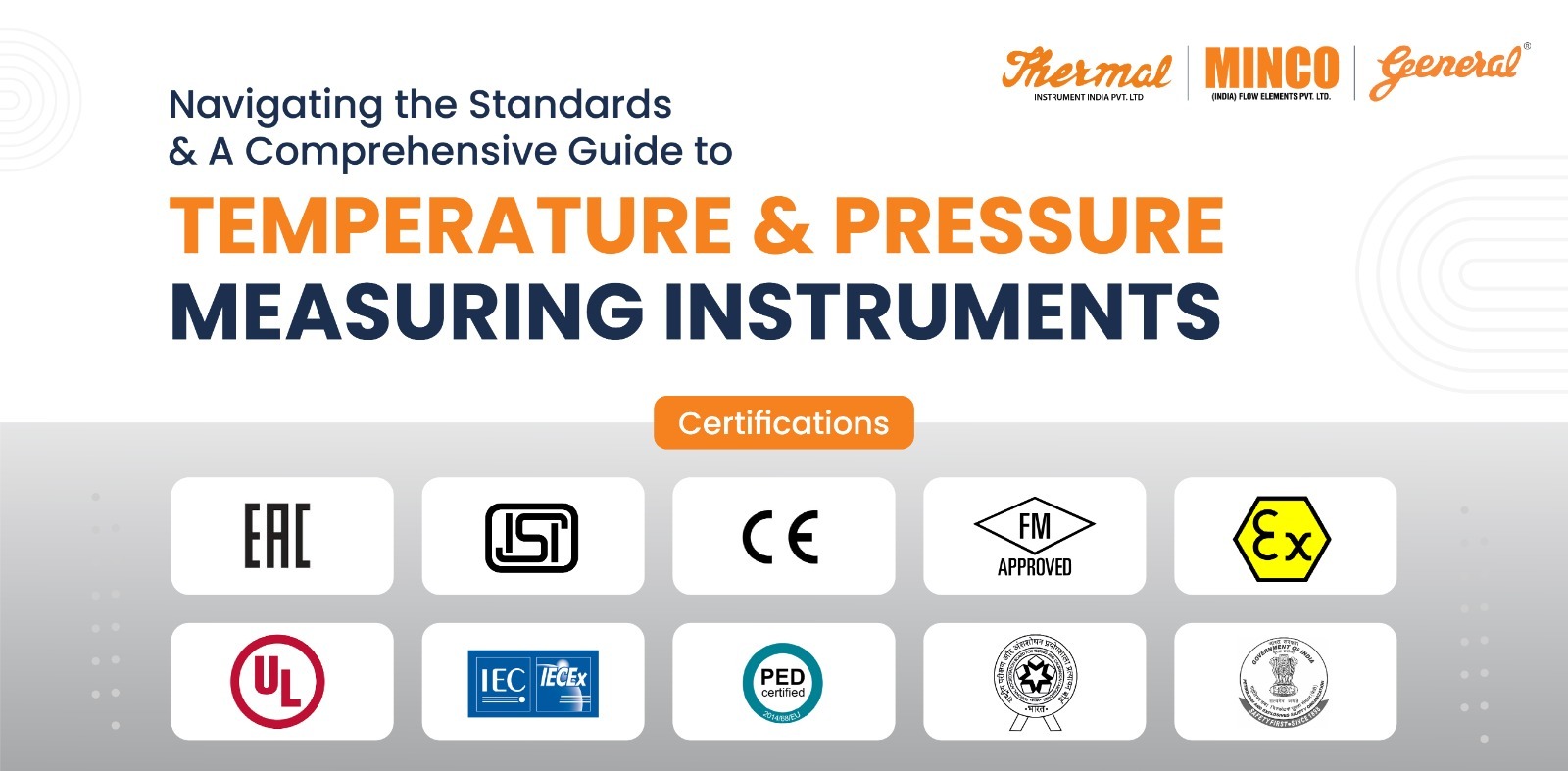
Navigating the Standards: A Comprehensive Guide to Temperature Measuring Instruments
When working with temperature measuring instruments daily, we constantly come across names of various standards and certifications; yet we are unaware of specific applications for specific certificates or standards. To raise awareness, we shall explore various certifications, as well as their significance and applications, in this blog.
IECEx Certification
The IECEx System intends to facilitate international trade in explosive atmosphere equipment while assuring safety. It provides lower testing costs, faster market access, and international confidence assessment. This certification can be used by manufacturers, regulators, and end users to address the danger of fires or explosions as it simplifies testing and certification processes, decreasing the financial load on producers. This can lead to more cost-effective product development.
IECEx certification instils confidence in the safety of products and services, promoting international trade by guaranteeing purchasers that equipment may be used safely in explosive atmospheres.
ATEX Certification
ATEX certification is required for equipment used in potentially explosive settings in the European Union and European Economic Area. It makes sure that operations are secure, and that health and safety regulations are followed. These criteria must be met by distributors, importers, and manufacturers. Equipment used in potentially explosive settings that has an ignition source must have ATEX certification. It ensures the safety of the equipment’s operation, lowering the possibility of accidents and explosions.
Products used in explosive environments must have ATEX certification to comply with strict safety regulations in the European Union and the European Economic Area.
CE Marking
The CE mark denotes European conformity and allows products to be distributed in the EU and EEA. It denotes adherence to certain norms and standards, ensuring that items fulfil safety standards. CE certification allows products to enter the EU and EEA markets, which are among the world’s largest. It denotes adherence to EU safety and quality standards.
CE marking ensures consumer safety and legal compliance by demonstrating that items meet critical health and safety regulations.
FM/UL Certification
FM and UL certifications emphasise dependability and fire safety, which are critical for equipment used in high-risk situations. They are frequently required for temperature measuring equipment in industries like as chemicals and petrochemicals. FM and UL certifications are highly valued for equipment used in high-risk environments. They concentrate on assuring the dependability of equipment, which is critical in environments where safety is vital.
These certifications are especially important for equipment in facilities that handle chemicals and other materials where fire safety is a top priority.
EAC (TRCU) Certification
EAC certification shows that a product complies with Eurasian Economic Union laws, allowing it to be marketed in a market of roughly 200,000 people across Eurasia. Fines and goods impoundment might ensue from trading without EAC certification. This certification provides access to a large market across the Eurasian Economic Union by guaranteeing that items fulfil regional legislation and standards.
CCOE Certification
The CCOE certification is distinctive to India and validates compliance with safety rules for temperature monitoring equipment used in explosive environments in industries such as mining and petrochemicals. Temperature measurement instruments utilized in explosive atmospheres in India’s hazardous industries such as mining and petrochemicals require CCOE certification.
It guarantees that equipment in these situations can operate properly, preventing accidents and protecting personnel.
Pressure Equipment Directive (PED) Certification
The Pressure Equipment Directive (PED) applies to the design, manufacture, and conformity assessment of pressure equipment and assemblies with a maximum allowable pressure greater than 0.5 bar gauge. This directive offers a legal framework for the seamless manufacturing and sale of pressure equipment within the European Union (EU). By adhering to common safety standards, manufacturers can gain approval for their products in any EU member state without undergoing multiple local approval processes. Working with BSI as your market access partner ensures an understanding of regulations, testing, and CE marking for PED compliance.
This Certification is mandaztory for Manufacturers, importers, suppliers, or authorized representatives of pressure equipment, including vessels, piping, safety accessories, and pressure accessories, selling into most European countries.
NABL Certification
The National Accreditation Board for Testing and Calibration Laboratories (NABL) is an autonomous body under the guidance of the Department of Science & Technology, Government of India. NABL accreditation holds immense importance for medical labs, testing centres, and healthcare providers in India. It provides a third-party assessment of quality and technical competence for laboratories, offering recognition that is acknowledged not only in India but also across major global economies.
Benefits of NABL Accreditation:
- Superior competence in calibration processes.
- Potential increase in business due to enhanced customer confidence.
- Recognition and broader reach of products in domestic and international markets.
- Time and cost savings from reduced retesting of products.
- Better control of laboratory operations and valuable feedback.
ISI certification
Indian Standards Institute certification, now known as the Bureau of Indian Standards (BIS), is a mark of quality, safety, and trust for various products. The ISI Mark, established in 1955, is an official mark given by BIS to producers whose products comply with Indian Standards (IS). This certification has been widely recognized as a symbol of quality assurance in India.
ISI certification is essential for manufacturers looking to demonstrate the quality and safety of their products, ensuring they meet the established Indian Standards. It not only boosts consumer confidence but also facilitates market access by adhering to regulatory requirements in India.
Various electrical appliances such as Electric Irons, Room Heaters, Room AC, Electric Stoves, Freezers, and Electric cables, as well as non-electrical products like UPVC Pipes, Rubber and leather Footwear, Composite Cements, and various acids, require mandatory ISI certification.
Key Benefits of ISI Certification:
- Symbol of Quality: The ISI Mark has been a recognized symbol of quality and safety since 1955.
- Conformity Marking: It serves as a conformity marking for industrial products, ensuring compliance with Indian Standards.
- Consumer Confidence: The ISI Mark instils confidence in consumers regarding the quality and safety of the certified products.
- Regulatory Compliance: It is a mandatory requirement for various electrical and non-electrical products, making it crucial for market access.
Thus, Standardising and certifying temperature measurement equipment is crucial for accuracy, safety, and legal compliance. These certifications, such as IECEx, ATEX, CE, EAC, CCOE, DGMS, FM/UL, and NABL, play a vital role in improving product quality, ensuring worker safety, and protecting the environment in a global marketplace.
